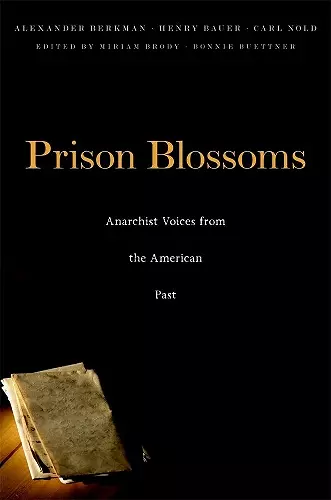Prison Blossoms
Anarchist Voices from the American Past
Alexander Berkman author Henry Bauer author Carl Nold author Miriam Brody editor Bonnie Buettner editor
Format:Hardback
Publisher:Harvard University Press
Published:4th Jun '11
Currently unavailable, and unfortunately no date known when it will be back

Prison Blossoms are a distant cousin of Gramsci's Prison Notebooks. This book reminds us how much we learn about the self-absorbed center of society from those who are caged in at its margin. A gem of a book. -- Mary Fainsod Katzenstein, author of Faithful and Fearless At long last, these passionate and perceptive anarchists can be heard! Magnificently edited and masterfully translated, Prison Blossoms should command the attention of anyone interested in the delivery, denial or deferral of justice in the United States. -- Glenn C. Altschuler, Cornell University
Published here for the first time is a crucial document in the history of American radicalism—the "Prison Blossoms," a series of essays, narratives, poems, and fables composed by three activist anarchists imprisoned for the 1892 assault on anti-union steel tycoon Henry Clay Frick.
In 1892, unrepentant anarchists Alexander Berkman, Henry Bauer, and Carl Nold were sent to the Western Pennsylvania State Penitentiary for the attempted assassination of steel tycoon Henry Clay Frick. Searching for a way to continue their radical politics and to proselytize among their fellow inmates, these men circulated messages of hope and engagement via primitive means and sympathetic prisoners. On odd bits of paper, in German and in English, they shared their thoughts and feelings in a handwritten clandestine magazine called “Prison Blossoms.” This extraordinary series of essays on anarchism and revolutionary deeds, of prison portraits and narratives of homosexuality among inmates, and utopian poems and fables of a new world to come not only exposed the brutal conditions in American prisons, where punishment cells and starvation diets reigned, but expressed a continuing faith in the "beautiful ideal" of communal anarchism.
Most of the "Prison Blossoms" were smuggled out of the penitentiary to fellow comrades, including Emma Goldman, as the nucleus of an exposé of prison conditions in America’s Gilded Age. Those that survived relatively unrecognized for a century in an international archive are here transcribed, translated, edited, and published for the first time. Born at a unique historical moment, when European anarchism and American labor unrest converged, as each sought to repel the excesses of monopoly capitalism, these prison blossoms peer into the heart of political radicalism and its fervent hope of freedom from state and religious coercion.
Prison Blossoms are a distant cousin of Gramsci's Prison Notebooks. This book reminds us how much we learn about the self-absorbed center of society from those who are caged in at its margin. A gem of a book. -- Mary Fainsod Katzenstein, author of Faithful and Fearless
At long last, these passionate and perceptive anarchists can be heard! Magnificently edited and masterfully translated, Prison Blossoms should command the attention of anyone interested in the delivery, denial or deferral of justice in the United States. -- Glenn C. Altschuler, Cornell University
These writings allow readers to examine the anarchists, who come off as well-read and articulate authors, quite different from the common view of anarchists at the time and somewhat since...Of interest to those studying the Gilded Age and the Progressive Era, political thought, and prisons, both historically and currently. A worthwhile purchase. -- S. A. Merriman * Choice *
- Nominated for Ray and Pat Browne Award - Best Reference/Primary Source Work in Popular and American Culture 2012
ISBN: 9780674050563
Dimensions: unknown
Weight: unknown
320 pages